Content note: Mentions self-harm.
On Sunday 27 November 2022 at 6am, my beloved cat Prince Ali passed away.
Prince first entered our family home as an eight-week-old kitten. It was the day before I turned 17. I’d spent months convincing my parents that it was a good idea to adopt a cat. Then, on the day before my birthday, my aunt took me to Baulkham Hills where a newly pregnant couple was giving away the kittens birthed by their cat. As soon as I brought him home, I knew no further convincing was needed. We gave Prince our surname and he soon became – in my mother’s words – her “fourth baby”.
Mum grew fond of Prince in a way that none of us expected. Her role as a stay-at-home parent meant that as we grew up and went off to school and Dad busied himself with earning a living, she often spent her days alone in an empty house. In Prince, not only did she find a steady companion but also someone she could de-stress and be playful with.
From the start, we knew that Prince loved us each individually, in ways we needed to be loved.
As someone who struggles with self-harm and is a diagnosed borderline, it was inexplicably comforting to be around someone who accepted me even when I had trouble accepting myself
Prince loved me when I was a bumbling mess, with snot dripping from my nose, hair oily and matted from not being able to shower. As someone who struggles with self-harm and is a diagnosed borderline, it was inexplicably comforting to be around someone who accepted me (and gave me hugs and nose kisses) even when I had trouble accepting myself.
READ MORE

How pets can boost mental health
Sometimes, Prince would find his way to me while I was coming down from a manic episode. Often, he would just sit and meow occasionally before stretching and curling up beside me. Other times, he would climb up my body, hidden under the covers, and use his soft paws to knead the area near my head or on my stomach.
The presence of a pet through trauma and dysfunction (or just the challenging thing called life) is beneficial on a physical and psychological level. During periods of our lives when things were especially hard – financial hardships due to COVID, the death of family members, strained relationships – knowing that we were responsible for Prince’s health and wellbeing often gave us reprieve from the overarching feeling of stress. Cats, as many people know, love routine. The recent boom of TikTok and Instagram reels of cats doing everything in their power to communicate that they are ready for food or a nap are more than just cute videos on the internet. In Prince’s case, he would often nip at my ankles, rub his body against my legs and arms and meow in our hallway if we were even five minutes late in serving him breakfast or dinner. And just like that, he instilled a semblance of routine into my life. It wasn’t until after he was gone that our family realised how much of our time, routine and decision-making processes were based around ensuring that Prince was properly loved and taken care of.
Cats, as many people know, love routine. The recent boom of TikTok and Instagram reels of cats doing everything in their power to communicate that they are ready for food or a nap are more than just cute videos on the internet. In Prince’s case, he would often nip at my ankles, rub his body against my legs and arms and meow in our hallway if we were even five minutes late in serving him breakfast or dinner. And just like that, he instilled a semblance of routine into my life. It wasn’t until after he was gone that our family realised how much of our time, routine and decision-making processes were based around ensuring that Prince was properly loved and taken care of.

“The presence of a pet through trauma and dysfunction… is beneficial on a physical and psychological level.” Source: Supplied
It wasn’t until after he was gone that our family realised how much of our time [was] based around ensuring that Prince was properly loved and taken care of
There have been well-meaning people who, after Prince’s passing, attempted to console us by saying things such as, “He’s just a pet,” “You’ll get over it,” and (perhaps the most unfortunate), “If you’re not strong enough to lose your pet, what are you going to do when your parents die?”
At the time, I didn’t know how to respond. But now, I can say for sure that grief, no matter how big or small, is still grief.
As humans, we spend our lives searching for acceptance, love and companionship. In animals such as Prince, we often find unconditional acceptance, love and companionship. This is why I think we have had such a hard time processing Prince’s passing.
After all, losing someone who gave our entire family joy and a sense of routine for six years is something that will take time – and all the patience that Prince has taught us – to reckon with.
For 24/7 mental health support, call Beyond Blue on 1300 224 636 or visit . For 24/7 crisis support, call . For support in your language, visit who support people from culturally and linguistically diverse backgrounds.




